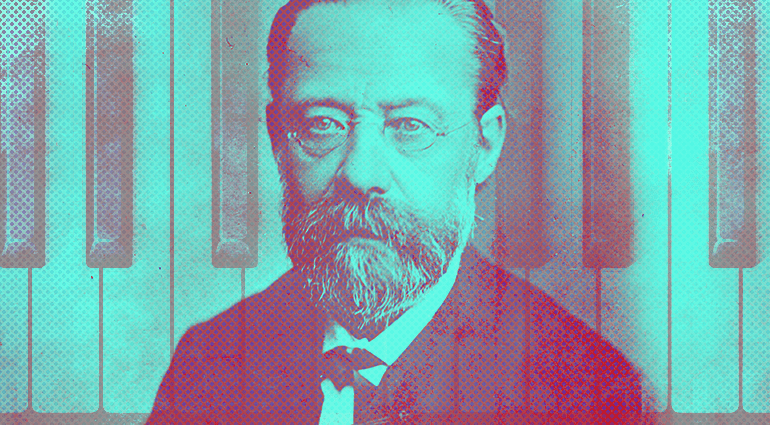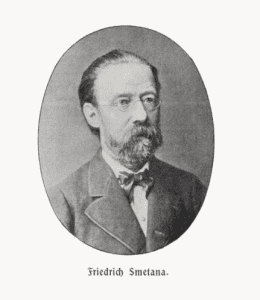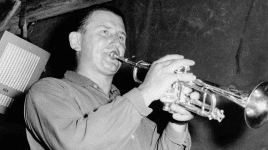
Bedřich Smetana is considered one of the most significant Czech composers. Together with Antonín Dvořák, he is referred to as one of the “Slavic masters”. While he was at times a controversial figure during his lifetime, monuments to Smetana now grace the streets of many Czech cities. Born on 2 March 1824, the genius would have been 200 years old today. His music lives on! We pay homage to Bedřich Smetana.
🎹
Celebrating 200 Years of Bedřich Smetana: Personification of the Czech national style
Smetana was a poet and thinker who became known as the “father of Czech music”. He quite rightly claimed to be a formative pioneer in the dramatic and symphonic segments of this genre. But he also experienced difficulties. As a follower of the composers Richard Wagner and Franz Liszt, whose political theories were controversial, some of his compatriots even considered him an enemy of the people at times. The differences were forgotten when, thanks to Smetana’s visionary reforms, the Prague Opera House rose to the same level of recognition as the established houses in Vienna or Berlin.

Spolier alert: We reveal below how Friedrich came to Bedřich .
Celebrating 200 Years of Bedřich Smetana:
Blows of fate and the refuge of music
Several strokes of fate overshadowed the composer’s life. In 1855, his then four-and-a-half-year-old daughter Friederike died of scarlet fever. Her younger sister Gabriela had already died the year before. In his despair, Smetana sought refuge in music. Immediately after Friederike’s death, he composed the Piano Trio in G minor in her memory – his first long-form masterpiece. Music became his acoustic language and powerful mode of expression. Initially, however, the premiere of the Trio was a fiasco, as the unusual melodies and the free structure did not appeal to the audience. That was soon to change.
You are currently viewing a placeholder content from Youtube. To access the actual content, click the button below. Please note that doing so will share data with third-party providers.
Smetana – Piano Trio in G minor, Op. 15 (Harriet Krijgh & Friends)
Theatrical pomp: A Bohemian-Czech trademark
Smetana’s stage works are considered essential pillars of his work. The production of “The Bartered Bride”, for example, became the epitome of Bohemian-Czech picturesqueness with its unusual mixture of imagery, subtle realism, theatrical pomp and dance-like sounds. However, he likely wouldn’t have reached the same level of fame if he had simply written music. Every note was an expression of a person who thought, lived and composed with strong opinions. His unifying thoughts became famous: “Where friendly paths converge, the world looks like home for an hour.”
You are currently viewing a placeholder content from Youtube. To access the actual content, click the button below. Please note that doing so will share data with third-party providers.
Smetana: Overture to “The Bartered Bride” / Jansons · Berliner Philharmoniker
Bedřich Smetana: His most important works
Between 1874 and 1879, Smetana composed the symphonic cycle “My Fatherland”, including the hugely popular piece “The Moldau (Vltava)”, which is without a doubt his most famous work and now considered a cornerstone of Czech culture. The composition traces the course of the river of the same name. It is no exaggeration to say that Smetana made the Vltava river famous even in far-away regions. Never before had such closely linked symphonic poems been published in cyclical form.
You are currently viewing a placeholder content from Youtube. To access the actual content, click the button below. Please note that doing so will share data with third-party providers.
Smetana – Die Moldau (Karajan – Berliner Philharmoniker)
You are currently viewing a placeholder content from Youtube. To access the actual content, click the button below. Please note that doing so will share data with third-party providers.
Smetana – Mein Vaterland (Semyon Bychkov – WDR Sinfonieorchester)
200 Years of Bedřich Smetana:
Taking detours
Born Friedrich Smetana, the eighth child of a brewer, he developed Czech national pride as an adult and changed his first name to “Bedřich”. He received violin and piano lessons as early as at the age of four. Later, Smetana studied piano and composition. He initially attempted a career as a concert pianist, but soon went on to teach at a music school he had founded. In 1856, he accepted an invitation to Sweden, where he worked as a conductor, pianist and lecturer in Gothenburg. After his return to Prague in 1866, he became conductor of the Czech National Theatre, which offered him an ideal forum for performing his own operas.
Nothing less than a new art form
With the genre of symphonic poetry, he developed the art form of combining orchestral compositions with elements of folk music. In doing so, he contributed to Bohemia being called the “conservatory of Europe” in the 18th century. The high level of musical education of the Prague audience surprised musicians from all over the world who visited the city on the Vltava. Smetana was by no means innocent of this in a positive sense.
You are currently viewing a placeholder content from Youtube. To access the actual content, click the button below. Please note that doing so will share data with third-party providers.
Smetana – String Quartet No. 1 (“From My Life”) – Dover Quartet
Celebrating 200 Years of Bedřich Smetana:
Between the day before yesterday and the day after tomorrow
Given Smetana’s cultural impact, it is only logical that his works continue to be interpreted by artists of today, even by some representatives of harder styles. For example, the German metal band Accept with guitarist Wolf Hoffmann has repeatedly staged compositions by Smetana:
You are currently viewing a placeholder content from Youtube. To access the actual content, click the button below. Please note that doing so will share data with third-party providers.
Accept – The Moldau (B. Smetana) (Accept & Lux Aeterna Orchestra, Novosibirsk)
You are currently viewing a placeholder content from Youtube. To access the actual content, click the button below. Please note that doing so will share data with third-party providers.
Wolf Hoffmann – The Moldau
You are currently viewing a placeholder content from Youtube. To access the actual content, click the button below. Please note that doing so will share data with third-party providers.
Milano Classic Rock Orchestra – The Moldau
Monuments and a museum
The fact that there are larger-than-life monuments to him in a number of Czech cities is an unmistakable proof of his significance. In 1926, the city council of Prague also erected a museum in his honour in one of the city’s most beautiful squares – symbolically right on the banks of the Vltava River with a view of Prague Castle. On display are numerous personal items, contemporary documents, and the piano on which he composed and played so many unforgettable melodies.
This link takes you to the museum’s website.
Click here for pianos and grand pianos at Thomann.
A reputation of galactic dimensions
However, his fame is by no means limited to his earthly successes. In fact, an asteroid was named after him in 1979, and a crater on the planet Mercury has borne his name since 1984. It’s certainly impressive when a worldly composer leaves his mark in space. But let’s stay on earth for now: this year’s Prague Spring Festival from 12 May to 3 June 2024 celebrates the Year of Czech Music and the 200th anniversary of Bedřich Smetana’s birth. Among other things, his epochal work “My Fatherland” will be performed by the Berliner Philharmoniker under the direction of chief conductor Kirill Petrenko. The opening of the annual multi-week cultural and music festival with this cycle has long since become an irrevocable tradition.
Sie sehen gerade einen Platzhalterinhalt von Standard. Um auf den eigentlichen Inhalt zuzugreifen, klicken Sie auf den Button unten. Bitte beachten Sie, dass dabei Daten an Drittanbieter weitergegeben werden.
A lot of shade under the musical sun
During his lifetime, Smetana repeatedly had health problems with his ears. He probably suffered from severe tinnitus as a result of a syphilis infection. In 1874, in his early 50s, he went completely deaf without the tinnitus improving. He then withdrew completely from public life. This was followed by mental illnesses, which increasingly affected him until he passed away on 12 May 1884 in a psychiatric clinic in Prague from the late effects of his untreated syphilis.
Feedback: 200 Years of Bedřich Smetana:
Do you know the works of Smetana? What’s your favourite piece? Feel free to tell us in the comments!
Sie sehen gerade einen Platzhalterinhalt von Standard. Um auf den eigentlichen Inhalt zuzugreifen, klicken Sie auf den Button unten. Bitte beachten Sie, dass dabei Daten an Drittanbieter weitergegeben werden.
You are currently viewing a placeholder content from Facebook. To access the actual content, click the button below. Please note that doing so will share data with third-party providers.
More InformationYou are currently viewing a placeholder content from Instagram. To access the actual content, click the button below. Please note that doing so will share data with third-party providers.
More InformationYou are currently viewing a placeholder content from X. To access the actual content, click the button below. Please note that doing so will share data with third-party providers.
More Information




